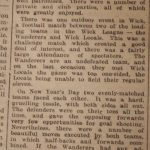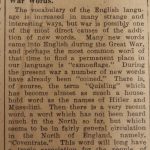The end of one year and the start of the next is always a time for taking stock. 1940 had been a particularly difficult year for Britain, with the introduction of rationing and shortages of food and goods. Western Europe had been overrun by German forces and the British army had only escaped by the skin of its teeth at Dunkirk. And although the R.A.F. had prevailed in the Battle of Britain, the Luftwaffe continued bombing British cities, causing terrible destruction and loss of life.
In Caithness Wick had suffered two cruel bombing raids; the education of the county’s children had been seriously disrupted; and a number of its fighting men, especially those serving in the Merchant and Royal Navy, had lost their lives. With the threat of invasion ever-present, Caithness remained in the front line, under the watch of the Home Guard and the Police.
Now the New Year brought another Allied victory in Libya, when Australian troops of XII Corps captured the port of Bardia and took 45,000 Italian prisoners. The next objective would be Tobruk, 70 miles along the coast. In Germany, a hundred RAF planes dropped incendiary bombs on the industrial part of Bremen on 1 January and started a firestorm.

The John O’Groat Journal reported a quiet new year in the North: “There was little outward sign of festivity, but most people spent a happy time in their homes or with their friends. First-footing, however, was general. The celebrations, in fact, were more or less confined to house-to-house visiting. Despite the seriousness of the times, the people showed high spirits and made the most of things.” On New Year’s Day the highlight was a football match between Wick Wanderers and Wick Locals (it ended in a no-score draw, after the Locals missed a penalty).

The Home Guard were to receive training in camouflage, and a letter was sent to all battalion commanders giving them notice. The letter added, with a touch of irritation, “In training, points to be emphasised are: camouflage is ordinary common sense – it is not magic, and is merely a different name for concealment…”
 Camouflage was one of the new words that the John O’Groat Journal reported as becoming common because of the war. “Quisling” was another (meaning a collaborator and traitor, named after the Norwegian Vidkun Quisling). But the word the author specially singles out, that will perhaps be least familiar to modern readers, is “Coventrate”, (“to devastate by aerial bombardment”, named after the destruction of Coventry by the Luftwaffe). “This word will long have a tragic association for the people of England, and can never affect the Germans with any other emotion than shame”.
Camouflage was one of the new words that the John O’Groat Journal reported as becoming common because of the war. “Quisling” was another (meaning a collaborator and traitor, named after the Norwegian Vidkun Quisling). But the word the author specially singles out, that will perhaps be least familiar to modern readers, is “Coventrate”, (“to devastate by aerial bombardment”, named after the destruction of Coventry by the Luftwaffe). “This word will long have a tragic association for the people of England, and can never affect the Germans with any other emotion than shame”.

Finally this week, the Pavilion Cinema was showing Walt Disney’s Pinocchio. The film had first been released in the UK in May 1941, and largely owing to the war had initially made a loss worldwide. As the John O’Groat Journal observed, “At this time of the year “Pinoccio” will be specially welcomed. We can’t have pantomime in the North, but we can have Disney.”

